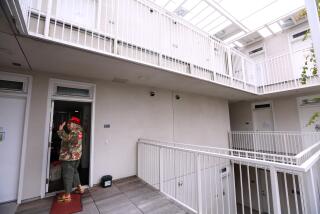League Is in the Way of Sales Tax Reform
- Share via
It’s clear that the way California cities pay the bills for basic services makes no sense. It is a dysfunctional mess.
For 20 years, California cities have demanded reform. Last month, the state Assembly took the first baby step by passing AB680, a pilot effort to share sales taxes revenue growth among Sacramento-area cities. But guess who led the opposition? The League of California Cities.
The league’s opposition is a classic case of the special interest politics that has hamstrung fiscal reform since the passage of Proposition 13 in 1978.
After Proposition 13 slashed property taxes, cities and counties faced draconian cuts in services, including police, fire, libraries and parks. But Gov. Jerry Brown and the Legislature stepped in to bail out local government using the state’s budget surplus. California voters loved the solution: lower property taxes with minimal impact on services. So they kept voting for tax cuts until the surplus was exhausted and the bailout was reversed under Gov. Pete Wilson. Then local governments had to scramble to maintain services and stay solvent.
Cities have been particularly ingenious at avoiding service cuts without going bankrupt through a range of questionable schemes, from back-door tax increases to postponing capital reinvestment until streets fall apart. But the most damaging trend has been to aggressively pursue sales tax revenue.
Auto malls and superstores now line our freeways, decimating local businesses and cannibalizing customers from older retail areas, leaving behind empty stores and dying shopping centers. Developers and out-of-state retailers have pocketed gargantuan subsidies as cities have been forced into cutthroat competition for retail development, while “cash box” zoning has paved over environmental concerns and blocked needed housing.
Why do cities chase sales taxes? Because for every dollar in sales, a penny comes back to the local city. So if you drive to Cerritos to buy a $30,000 Ford Explorer, Cerritos gets $300. That’s more than cities collect as their share of a whole year’s property tax for a median-priced home in all but the most affluent towns.
So with the biggest auto mall in Southern California, it’s no wonder that Cerritos can afford a new 82,500-square-foot library clad in titanium. But without any auto dealers, Azusa voters had to approve higher property taxes and compete for scarce state matching funds to replace the city’s obsolete library.
Short of betting in Las Vegas, it would be hard to devise a worse way to fund city services. The current sales tax allocation system has been denounced by the Little Hoover Commission, a bipartisan watchdog agency, by the Public Policy Institute of California and by the Speaker’s Commission on Local Finance.
But powerful developers and retailers like the advantage it gives them to extract subsidies or bend environmental protections. With lower costs of providing services than inner cities, wealthy cities and sprawling suburban communities love getting a higher share of the loot.
And the League of California Cities is so myopic that it sees any attack on titanium-clad libraries as a threat to “local control.” But instead of local control, the league’s position really promotes out-of-control sprawl.
Against this powerful coalition invested in the status quo, disadvantaged communities can muster neither campaign cash nor lobbying clout.
The only countervailing hope for reform is the greater good of the state, which ordinarily carries little weight with the Legislature or governor. But Assemblyman Darrell Steinberg (D-Sacramento) has pushed AB 680 through the thicket of committees by being flexible and savvy enough to compromise on his tax-sharing formula.
Now Steinberg’s bill is in the state Senate. And although it applies only to the Sacramento area, it could be a model for the state. If the league succeeds in killing it, comprehensive reform may be dead for years to come.
*
Rick Cole is city manager of Azusa.
More to Read
Get the L.A. Times Politics newsletter
Deeply reported insights into legislation, politics and policy from Sacramento, Washington and beyond. In your inbox twice per week.
You may occasionally receive promotional content from the Los Angeles Times.










